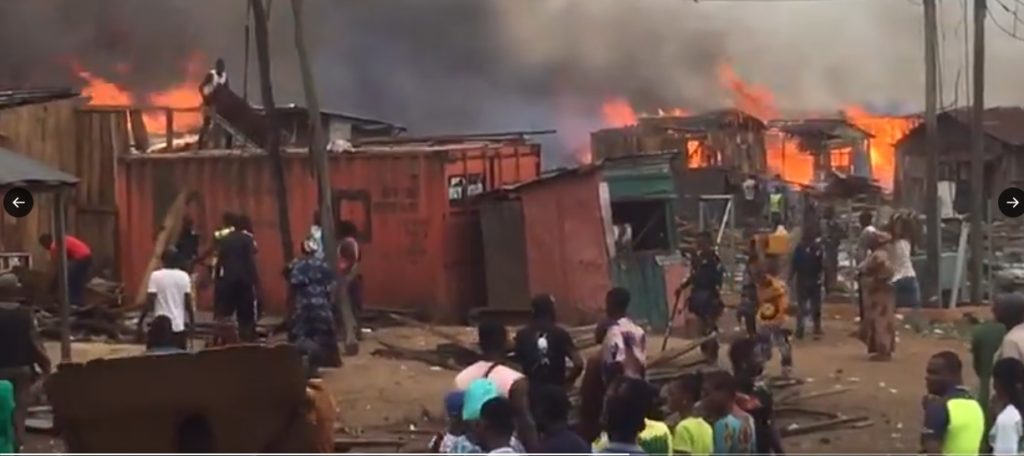Six civil society organisations on Tuesday condemned the forced evictions of Ayetoro and Oko Baba communities in the Lagos Mainland Local Government Area of the State. The activists also warned against the plan to sack the Sogunro community in what has been a spree of mass displacements of poor communities by the Lagos government.
Thousands of families in Ayetoro and Oko Baba were attacked and displaced by armed policemen and officials of the state government who set their homes on fire between September 14 and 16.
A statement jointly signed by Megan S. Chapman (Justice & Empowerment Initiatives), Mohammed Zanna & Bisola Akinmuyiwa (Nigerian Slum/Informal Settlement Federation), Betty Abah (Centre for Children’s Health, Education), Olamide Udoma-Ejorh (Lagos Urban Development Initiative), Abiodun Baiyewu (Global Rights), and Yemi Adamolekun (Enough Is Enough), said the action of the government was callous.
The statement titled; ‘Joint call for an immediate end to mass forced eviction of waterfront communities in Lagos to save the people of Makoko/Iwaya waterfront,’ reads: “We, the undersigned members of civil society, including organized residents of informal settlements and their long-term NGO partners, condemn the forced eviction of Oko Baba and parts of Ayetoro community starting on 14 September 2024 by the Lagos State Government – and we call for an immediate stop to the imminently threatened eviction of Sogunro community.
“On Saturday, 14 September 2024, the Lagos State Building Control Agency (LASBCA) announced on social media that it was commencing the “clearing of shanties” in the sawmilling waterfront community of Oko Baba. The same day, residents saw their homes and workplaces lit on fire, evicting thousands, while the media carried the story of a “fire outbreak” in the area. A day later – on the public holiday celebrating the Prophet Mohammed’s birthday – the neighboring community of Ayetoro – reportedly the first Ilaje settlement in Lagos dating back to 1912 – was caught unawares as the demolition squad began destroying homes without notice.
“While thousands of evictees from Oko Baba and Ayetoro communities were sleeping outside, in the late afternoon of 17 September 2024, LASBCA officials together with officers from the Mobile Police (MOPOL) of the Nigerian Police Forced, descended on the neighboring waterfront community of Sogunro – one of the villages comprising the Makoko/Iwaya waterfront. Armed officers came by boat and went round the community, informing everyone that they should pack out before the following morning when they threatened the squad would come back and would begin to demolish the community and set all remaining properties ablaze.
“Over the years, we have seen too many of our sister/partner communities forcibly evicted without any consideration for the rule of law, the protection of fundamental rights enshrined in the Nigerian Constitution, or the dire social and economic consequences for tens of thousands. We shudder to imagine the scale of the impact if Sogunro should meet this same awful fate, in particular during this time of extreme economic hardship and knowing the disproportionate impact that such evictions have on children, women, elderly and other vulnerable populations.
“The Lagos State Government is well aware that there are better ways to develop the city – that this can be done through win-win partnership with communities to embark on in situ upgrading.
“Indeed, just over a month ago, the Lagos State Government approved a pilot project for in situ upgrading of a small area of Makoko through the Dutch-Nigerian firm Nlé. Meanwhile, a Nigerian film about the horrors of forced eviction, The Legend of the Vagabond Queen of Lagos, just premiered at the Toronto International Film Festival to much acclaim. Certainly, then, this is the moment for Lagos to break from the past and embrace a new approach, rather than jeopardizing its future development prospects and destroying tens of thousands more lives.”










More Stories
Zelensky says he is ‘ready’ to resign as Ukraine president
In mass firings, Elon Musk’s DOGE demands U.S. federal employees detail work done in previous week or turn in resignations
Kidnappers abduct 60-year-old patient from Kano Neuro-Psychiatric hospital